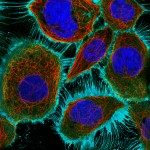Link to Pubmed [PMID] – 17434595
J. Biochem. Biophys. Methods 2007 Jun;70(4):663-9
Dissection of signal transduction pathways leading to actin polymerization has been performed in cytosolic extracts. In such assays, the implication of an effector molecule is demonstrated by the loss of actin polymerization upon its depletion and the restoration of actin polymerization upon its add-back. Two major limitations in the wide use of this approach have been the availability of immunodepleting antibodies and the functional redundancy for many classes of effector molecules encoded by vertebrate genomes. To circumvent these limitations, we developed extracts derived from S2 Drosophila cells, which are competent for actin polymerization. In this system, depleted extracts are simply obtained from cells cultured with long double stranded RNAs in the medium. We validated the method by showing that beads coated with the C-terminal domain of Wave2 were no longer able to trigger actin polymerization in an extract depleted of the Arp2/3 complex. We also examined the complete set of Drosophila small GTPases of the Rho family for their ability to polymerize actin in such extracts, and found that only dCdc42 was able to induce actin polymerization. Using RNAi depleted extract, we confirmed that dCdc42 triggers actin polymerization in a Wasp dependent manner.

